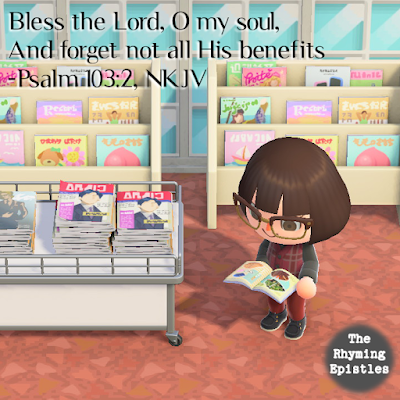Yet Will I Trust In Him: Trusting God Over People (Job 13:7-16)
“Though He slay me, yet will, yet will… Yet will I trust in Him.”
– Men of Standard
\(x_x)/
Dear hearer of hunches,
Don’t believe everything people say. Inquire first if it is
according to the Way. Take this blog of mine for instance. I may be speaking
about the Life’s word from my stance, but all is based on the Truth’s reliable worshippers.
Jesus is the Way, the Truth, and the Life (John 14:6) whose word ever lingers.
Let us see here how Job rejects the false theology of his
friends and how he declares his trust in God.
Job 13:7-16 (KJV)
7 Will ye
speak wickedly for God? and talk deceitfully for him?
8 Will ye
accept his person? will ye contend for God?
9 Is it
good that he should search you out? or as one man mocketh another, do ye so
mock him?
10 He will
surely reprove you, if ye do secretly accept persons.
11 Shall
not his excellency make you afraid? and his dread fall upon you?
12 Your
remembrances are like unto ashes, your bodies to bodies of clay.
13 Hold
your peace, let me alone, that I may speak, and let come on me what will.
14
Wherefore do I take my flesh in my teeth, and put my life in mine hand?
15 Though
he slay me, yet will I trust in him: but I will maintain mine own ways before
him.
16 He also
shall be my salvation: for an hypocrite shall not come before him.
I used the King James Version because I want to show that
Job is speaking to his three friends when he said, “Will ye speak wickedly for
God?” What wrong things did they say about God? Eliphaz suggested that God
destroys sinners only and not the upright (Job 4:7-9), Bildad declared, “God
will not reject a person of integrity, nor will He help evildoers” (Job 8:20
NASB), and Zophar said, “God exacts from you less than your iniquity deserves”
(Job 11:6 NKJV) and that the hope of the wicked is the loss of their life (Job
11:20).
If we look at the story of Cain and Abel in Genesis 4, we
see God had regard with Abel over Cain, but he allowed the death of Abel in
Cain’s hands. God even protected the life of Cain afterwards. This is the
opposite of what Job’s friends said.
In verse 8, Job asks them, “Will ye accept his person?” In
newer versions, it’s translated as “Will you show partiality for Him?” His
friends’ defense for God was He deals with people according to their character,
so their sufferings is equivalent to their blame
Job then compares their remembrances to ashes and their
bodies to clay. In the Bible commentary by John Gill (1763), he wrote that Job’s
friends' "memorable sentences" were unimportant and easily blown like
ashes and that their bodies, which could be thought like shields or fortresses,
are like frail, brittle earthen vessels.
In verse 14, Job asks his friends why they think he puts himself in danger as if he bites himself. Albert Barnes (1884) wrote that this is “a firm and determined purpose that he would express his sentiments, no matter what might occur - even if it involved the peril of his life.”
The last two verses are worth admiring. Well, part of them are. Job says that even when he’s life is being taken away from him, he will still trust God, or in other translations, he will still hope in Him. However, he says he will defend his ways to God, which is a way of boasting, so that part is something we shouldn’t do. Job was just being honest, for he didn’t do anything to cause God’s anger. In the final verse, he looks to God as his salvation and claims that he isn’t a hypocrite, so he can come before God. Gill wrote that “though he asserted the integrity of his heart and life, yet did not depend on his ways and works for salvation, but only on the Lord himself.”
We should not even trust ourselves. I don’t mean having
self-doubt. Our confidence must be on God. We should think that we can’t do
anything without God. We should not depend on our own abilities. God should be
our strength, our righteousness, and our salvation.
By not trusting on yourself, it is equivalent to not
trusting man. That is what Job did. He didn’t believe his friends when they
said he must have sinned and caused destruction on himself. He put his trust in
God. He believed that his ways are according to God’s ways. He lived a life
following God.
Let us not depend only on ourselves or on people. Let us
trust God above all and make His word our nourishment’s staple. Let us have confidence in Him no matter what happens to us. Let us surrender our lives to Jesus. When you
accept His Lordship is true, He’ll be the One living in you. There’s nothing to
fear anymore once you let Him through your heart’s door.
With love,
Celina <3
References
Barnes, A. (1884). Job 13 Commentary - Albert
Barnes' Notes on the Whole Bible. Retrieved from
Truthaccordingtoscripture.com:
https://www.truthaccordingtoscripture.com/commentaries/bnb/job-13.php#.YMtan6gza02
Gill, J. (1763). John 13 Commentary - John Gill's
Exposition on the Whole Bible. Retrieved from Truthaccordingtoscripture:
https://www.truthaccordingtoscripture.com/commentaries/geb/job-13.php#.YNArXOgza01
Next: Unpredictable: No One Can Calculate God (Job 23:8-17)
Previous: Hold My Heart: Letting It All Out to God (Job 7:12-20)



Comments
Post a Comment